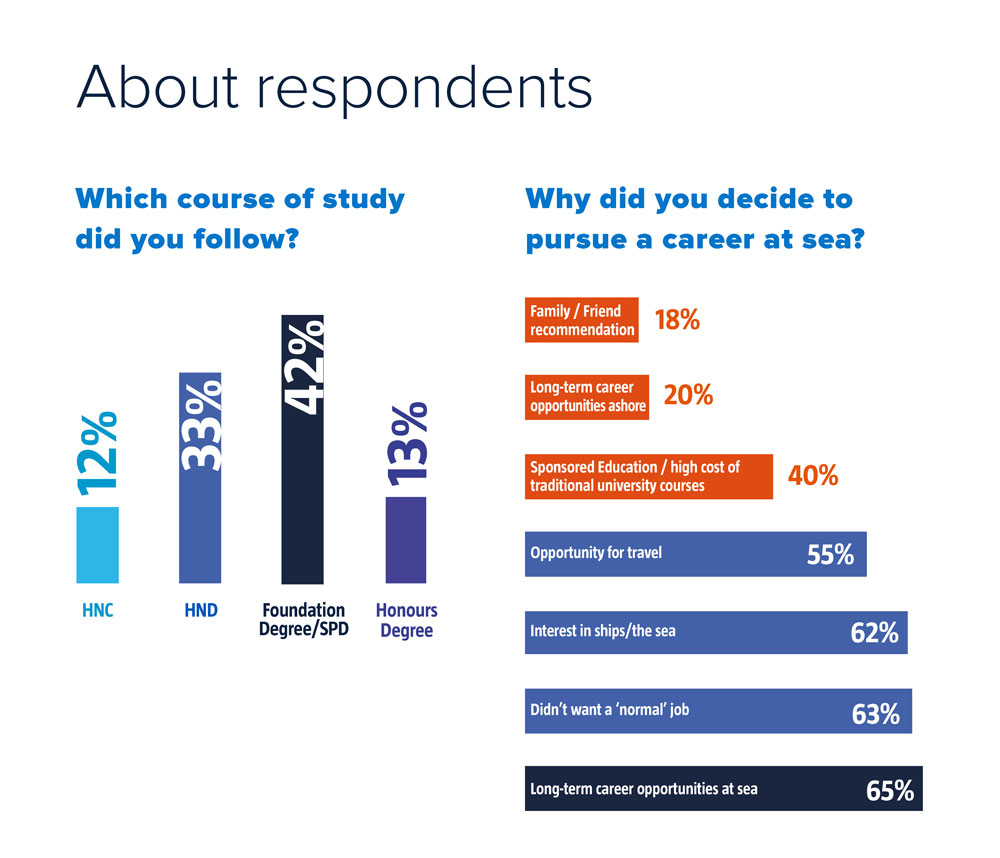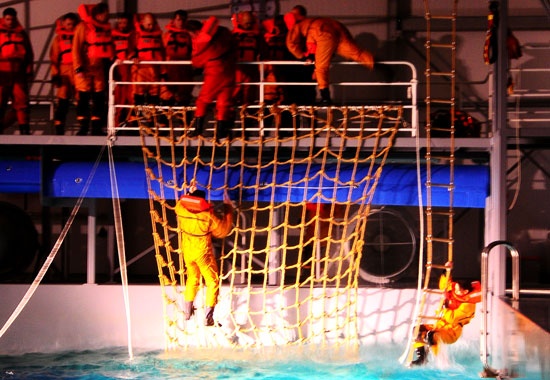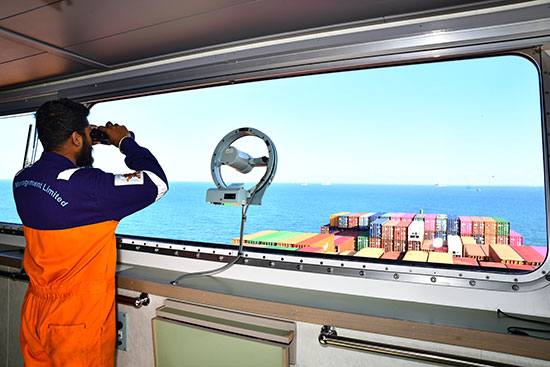- Topics
- Campaigning
- Careers
- Colleges
- Community
- Education and training
- Environment
- Equality
- Federation
- General secretary message
- Government
- Health and safety
- History
- Industrial
- International
- Law
- Members at work
- Nautilus news
- Nautilus partnerships
- Netherlands
- Open days
- Opinion
- Organising
- Podcasts from Nautilus
- Sponsored content
- Switzerland
- Technology
- Ukraine
- United Kingdom
- Welfare

Nautilus International asked recently qualified members to share their views on the training experience, in support of the Maritime Skills Commission's work to improve industry education. The results show a desire among many UK seafarers for modernisation – and a need for both sponsoring companies and colleges to better support cadets
During the summer of 2020, the UK Government launched the Maritime Skills Commission (MSC) as part of its Maritime 2050 strategy to ensure the industry has a pipeline of talented people.
Once established, the MSC formed a cadet review sub-group charged with making recommendations on the cadet training experience.
Among the commissioners appointed to the MSC by the UK Maritime Minister is Nautilus general secretary Mark Dickinson.
'I am keen that Nautilus supports the work of the MSC since we share a desire that the UK grows its maritime skills base,' he says. 'I was also pleased to join the cadet review sub-group. It is vital that the views of maritime professionals are included in any review of their training.'
To learn more about these views, Nautilus International carried out a member survey of Merchant Navy officers who completed their maritime training within the past 10 years. These members have a unique insight into the standards of the training they received and how well it prepared them for the realities of working at sea.
The survey took place between September and December 2020, during which 118 valid responses were received, equating to 3.5% of Nautilus's total UK young members (those aged 35 or below). Of these, 50 said they were interested in taking part in further discussion and were invited to a meeting held in March to add more detail.
It is vital that the views of maritime professionals are included in any review of their training

Who are the respondents?
The age range of respondents is broadly in line with what is expected for a survey of recently qualified officers – 36% were between 18 and 24, and 62% between 25 and 34. Around 15% were female, reflecting that more women are coming into the industry.
A third of respondents were still undertaking their cadetships, while 17% were engineer officers and 42% were deck officers. The remainder were shore-based or electro-technical officers (ETOs) and three were master/chief engineer rank (under 35 and within ten years of qualifying). The age is also reflective of their qualification level: 64% had either deck or engine officer of the watch (OOW) certificates, 10% were seconds and 26% had chief officer certificates.
All the main maritime colleges were represented, with the small number of 'others' including the UKSA and Britannia Royal Naval College.
The most popular alternative career choices included airline pilot, IT, other type of engineer/electrician, other maritime-related career, law, Royal Navy or other armed forces, and the emergency services.
Nautilus also asked why the respondents decided to pursue a career at sea – an important question for the MSC, which hopes to increase the flow of strong candidates into the industry.
The most common choice for respondents was the attraction of 'long-term career opportunities', an interesting result which has fed into the post-survey recommendations made by Nautilus to the MSC.
How do cadets rate training institutions?
The survey asked respondents about the interest that companies, colleges, and sponsoring organisations took in the various aspects of their training. Overall, they were not particularly enthusiastic about the level of support and mentoring received.

Looking at sponsoring companies, only 38% of respondents considered that the companies had shown strong or good interest in their college phase. Worse, fewer than half believed that they had shown strong or good interest in the sea phase. There does seem to have been something of an improvement in recent years, however.
Meanwhile, over 60% of colleges had very little interest in what happened to students when they were 'out of sight' on their sea phases, with no sign of improvement over time.
There was a similar worrying trend in the overall rating respondents gave to the leadership and management aspects of their training. Only 7% said it was excellent and 13% rated it as very poor. In terms of technical content, things were slightly more positive; over half said the experience covered all the technical aspects that it needed to. Yet many respondents later in the survey had suggestions for different technical areas that they would like to see added to training.
Open feedback
Respondents also shared their opinions on maritime training in open questions.
The former cadets had strong opinions on a whole range of issues. One point that came up again and again was the need to modernise training. Respondents called for a reform of cadet sea time to ensure it delivers valuable experience; a revision of the Merchant Navy Training Board (MNTB) Training Book; more focus on management and organisation skills; and a change in focus away from older technologies and towards training for modern requirements and ship types.
The idea of increasing simulator time was also popular. In the earlier part of the survey, over 70% of respondents said that they would have benefited from additional simulator time during their training, to cover:

Some said they would have benefitted from simulator time in other areas, including different types of transit (canal, open sea, anchorage, etc.), machinery breakdown, ECDIS familiarisation, night-time lookout, and following Masters' standing orders.
In terms of the educational experience, they requested everything from increased salary for cadets to more experienced lecturers, and extended course time with more scope to work on each piece of equipment.
A significant issue identified in the comments and other answers is that cadets often feel they are undervalued and their training seems to always be somebody else's responsibility – in the words of one respondent, 'Sea thinks college should teach everything; college thinks sea should'.
Does training lead to a career?
Training is only worthwhile when put to use – naturally, it is important to know whether cadets are able to secure a position at the end of their education.
More than 80% of respondents said that they had got a job after qualifying, though it is unclear as to whether all these cadets found a position in maritime.
From other questions on the survey, it is apparent that more than half were employed by their sponsoring company immediately after qualifying; those who were not took more than three months to find a position.

Some 75% of respondents secured permanent positions, with salaries normally in the range of £25,001 to £35,000.
Most respondents secured positions as third mates or fourth engineers, although there was a worrying trend for qualified officers to sail as ratings, volunteers, or continue as a cadet for at least one trip.
The survey found that 17% of respondents struggled to find employment. Most did eventually manage to get a position at sea (on average one year after qualifying). Recent graduates were affected by Covid-19, which led to some job offers being rescinded.
Recommendations
Considering these results, Nautilus has made several recommendations to the MSC sub-group.
Provide long-term career options
In the past, cadet recruitment was limited by the number of places on offer, but companies are now reportedly struggling to find enough suitably qualified applicants. A very large proportion of respondents stated that long term career opportunities were among their reasons for choosing the career; It is therefore vital that the cadet offering continues to meet expectations in terms of career progression opportunities and the competitiveness of the package when compared with other options such as apprenticeships.

Based on this, Nautilus is recommending that:
- Cadets are provided with accurate and realistic information relating to long-term career paths, including information about the option to move on shore, at the onset of training
- Opportunities exist to facilitate the long-term prospects of new entrants, for example through programmes that give cadets the skills they need to future-proof their careers
- The HNC programme should be revaluated – is it able to meet the career aspirations of cadets both at sea and ashore, especially in light of changes in the regulatory environment which include National Minimum Wage (NMW) legislation, Brexit, and the points-based immigration system?
Offer greater support
Respondents frequently reported a lack of interest by companies and colleges in their training. Nautilus therefore recommends more co-ordinated support to cadets through their college and sea phases.
- Review the role of the company training officer to find out whether changes are needed to ensure that cadets feel adequately supported
- Encourage greater coordination of support during college and sea phases. Ensure that there is a safety net if, for whatever reason, a cadet feels they are not getting adequate support
- Increase external monitoring of support provided to cadets to ensure parties are meeting their obligations
Improve course content
Based on feedback about the quality of training received, Nautilus recommends:
- The continuation of work to modernise the syllabus. Although overall perception of the technical content was good, attention should be paid to ensuring that training remains relevant and that cadets are satisfied with the structure and delivery of academic content
- Completion of the Maritime and Coastguard Agency's (MCA's) work to modernise Human Element, Leadership and Management (HELM) training
- Increased simulator training. Over 70% of respondents were in favour of additional simulator time and pointed to emergency procedures and complex collision avoidance as scenarios that should be covered. It is worth noting that controversy around simulator training relates to the reduction of sea time, not the use of simulators per se
Track employment
Nearly 20% of respondents reported that they had failed to find employment after qualifying. However, it is difficult to draw any concrete conclusions from this data; for example, the respondents are drawn from Nautilus membership and followers of Nautilus social media pages, so it is likely that the sample is skewed to those working in the industry.
Based on this, Nautilus recommends that a system is implemented to track outcomes for cadets once they have qualified.
- read the full survey results and complete list of Nautilus recommendations
Tags
